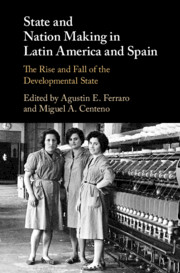Book contents
- State and Nation Making in Latin America and Spain
- State and Nation Making in Latin America and Spain
- Copyright page
- Dedication
- Contents
- Figures
- Tables
- Contributors
- Preface
- Part I Introduction
- Part II Visions and Politics of Development
- Part III Institutional Design: Infrastructural and Territorial Power
- Part IV Industry, Trade, and Growth: Economic Power
- Part V National and Civic Identities: Symbolic Power
- Part VI Conclusion
- Index
- References
Part I - Introduction
Published online by Cambridge University Press: 01 December 2018
- State and Nation Making in Latin America and Spain
- State and Nation Making in Latin America and Spain
- Copyright page
- Dedication
- Contents
- Figures
- Tables
- Contributors
- Preface
- Part I Introduction
- Part II Visions and Politics of Development
- Part III Institutional Design: Infrastructural and Territorial Power
- Part IV Industry, Trade, and Growth: Economic Power
- Part V National and Civic Identities: Symbolic Power
- Part VI Conclusion
- Index
- References
- Type
- Chapter
- Information
- State and Nation Making in Latin America and SpainThe Rise and Fall of the Developmental State, pp. 1 - 26Publisher: Cambridge University PressPrint publication year: 2018



